After months of violence, Brazil chooses their new leader
Brazilians vote between two well known candidates in an upcoming election.
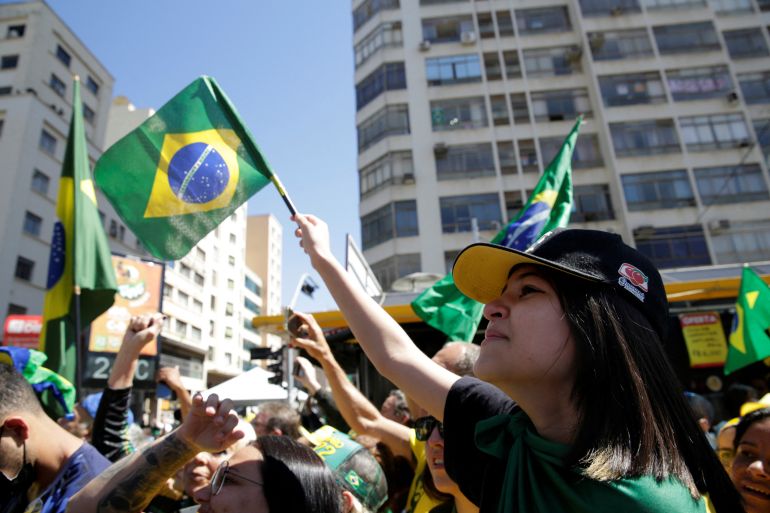
Brazil is about to vote in a general election on October 2. The country will pick between two candidates surrounded by controversies, former President Luiz Ignacio Lula da Silva and current President Jair Bolsonaro. And with this, Brazilians are at a crossroads looking towards the past to choose the best option for their future. Today, a look into this weekend’s election.
Keep reading
list of 4 itemsCoping with climate change on Mt Everest
Is Italy returning to its Fascist past?
How are Black American farmers reclaiming their land?
In this episode:
- Lucia Newman (@lucianewman), Al Jazeera Latin America editor and senior correspondent
Connect with us:
@AJEPodcasts on Twitter, Instagram, and Facebook
Full episode transcript:
This transcript was created using AI. It’s been reviewed by humans, but it might contain errors. Please let us know if you have any corrections or questions. Our email is TheTake@aljazeera.net.
Halla Mohieddeen: This weekend, Brazil is electing a new president, but the two candidates facing off in this first round are very familiar faces.
Newsreel: Former Brazilian president Luiz Ignacio “Lula” da Silva has officially launched his presidential campaign.
Newsreel: Now Brazilian president Jair Bolsonaro kicked off his candidacy for re-election.
Halla Mohieddeen: However, violence has become quite common in the political scene in Brazil.
Newsreel: A supporter of President Jair Bolsonaro is accused of shooting and killing a political opponent at the victim’s birthday party.
Newsreel: During the past three years, political violence in Brazil has tripled.
Halla Mohieddeen: So with both candidates’ pasts full of controversy, Brazilians are left at a crossroads with picking who will offer the best path forward for their country.
Halla Mohieddeen: I’m Halla Mohieddeen, and this is the Take.
[THEME MUSIC PLAYING]
Lucia Newman: My name is Lucia Newman. I’m Al Jazeera’s Latin American editor and senior Latin American correspondent. I am in Brazil right now and I’m currently in the largest city, São Paulo.
Halla Mohieddeen: Lucia, you’re in Brazil because of the upcoming elections. Just start us off by explaining this election, it’s really between two men who’ve been in office before, isn’t it? Who are they?
Lucia Newman: This is an election between two people that Brazilians know.
[MUSIC PLAYING]
Lucia Newman: One of them is former two-time President Luiz Inacio Lula da Silva.
[CROWD CHEERING]
Lucia Newman: Whom many regard as a man who saved Brazil and who actually catapulted Brazil out of poverty and misery and he’s a very interesting person.
Newsreel: Lula served eight years as president ending in 2011. He was vastly popular overseeing a left-wing agenda that saw strong economic growth and a reduction in inequality.
Lucia Newman: He does not have a formal education. Never had one. He’s from the poorest part of this country.
Lucia Newman: He left office with more than 80 percent approval rating. But most importantly of all, Lula became known as the man who helped the poor. People who lived the way he had lived when he was a child. Thirty-three million people, many of whom were going hungry and who had no decent housing, no decent wages, who had never been on an aeroplane before. These are the people whom he helped. So he became an idol for many because of that.
[CROWD CHEERING]
Lucia Newman: But, there was another side to the Lula regime.
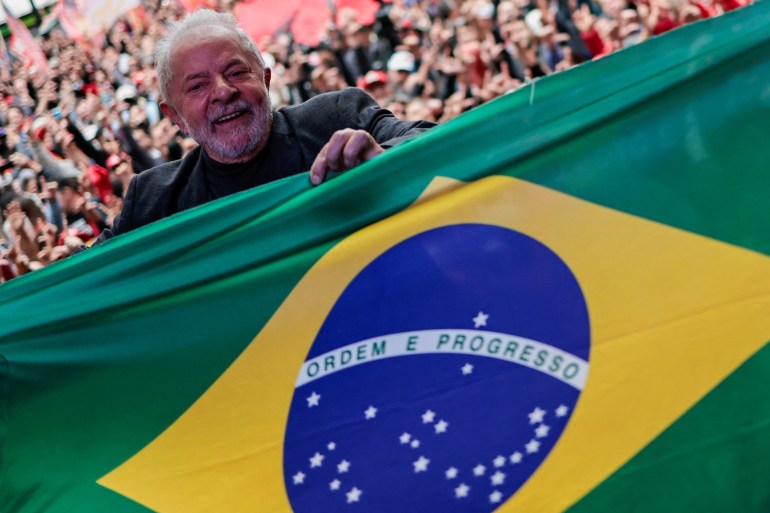
[MUSIC PLAYING]
Halla Mohieddeen: A corruption scandal engulfed Brazil. The investigation nicknamed Operation Car Wash led to the indictment of dozens of business people and politicians, many of them convicted for money laundering in connection with the government-owned oil company Petrobras.
[MUSIC PLAYING]
Newsreel: Former Brazilian president Lula da Silva has been sentenced to nearly 10 years for corruption.
Lucia Newman: I remember from the very beginning when I started covering Lula from his first term and then the second term, there were all these rumblings about hanky panky going on in terms of finances. This multi-billion-dollar craft scandal exploded after he left office in 2010. And millions of Brazilians started to demand that Lula go to jail. He was convicted and imprisoned on charges of money laundering and corruption but he always said that he was not guilty, that this had been a political setup to get him out of the picture so he could not run for president again.
Halla Mohieddeen: But just before this election, that changed. The court annulled his conviction on a technicality.
Lucia Newman: In other words, the Supreme Court did not rule that he hadn’t accepted bribes, but rather that the process had been corrupted. Anyway, he is back again running for president. But these charges of corruption still weigh heavily on him.
[MUSIC PLAYING]
Halla Mohieddeen: Well, that’s given us a good idea of who Lula is and was. What about Bolsonaro? His challenger, the other guy running for election? Who’s he?
Lucia Newman: He is economically and ideologically the extreme opposite of Lula da Silva. Although I would say Lula da Silva is not an extreme left-winger. But certainly Jair Bolsonaro is a very extreme, far-right conservative in every sense. He believes in guns. He has a lot of things in common with Donald Trump from the United States, whom he greatly admires. He was not part of any well-known political party, but he was considered so outrageous, such a loose cannon that people voted for him because he said what he thought. Everything that was politically incorrect came out of the mouth.
Halla Mohieddeen: Here’s Bolsonaro in 2013 during an interview with the BBC.
Jair Bolsonaro: We as Brazilians hate homosexuals.
Halla Mohieddeen: And this one is from 2014, while he was a member of Congress during an exchange with a congresswoman.
Jair Bolsonaro: I would never rape you because you don’t deserve it.
Lucia Newman: A lot of people won’t say that, but he would, and eventually he became the symbol of everything that was not part of the political system. and, people in Brazil began to really equate themselves with the things he defended at a time when the country was going downhill economically and in the views of many also morally.
Halla Mohieddeen: Despite his popularity, Bolsonaro’s presidency was ultimately eclipsed by a larger issue, the COVID-19 pandemic.
Lucia Newman: When the pandemic took place, he said things like, oh, well, you know, people die every day. You have to die sometime. It’s time to go back to work. He refused to allow vaccines or to pay for vaccines for a long, long time. And Brazil, as you may remember, had one of the highest mortality rates from the pandemic in the world.
Newsreel: To Brazil, where more than 600,000 people have now died from COVID-19.
Newsreel: It’s the second highest death rate worldwide per capita.
Lucia Newman: And so that made him very, very unpopular.
Halla Mohieddeen: But Lucia says that during this election cycle, there are other concerns for voters when it comes to Bolsonaro.
Lucia Newman: People have become a little bit afraid of the things he says. Even before the election even takes place, he is questioning whether it will be a legitimate election saying that the electoral voting system that this country has had for decades, which has never ever been questioned before, is going to bring about fraud. Those sorts of things have raised eyebrows among Brazilians who at first liked him, but say, our democracy is now in danger. And, he has a lot of support from the military and that makes his threat to not stand for any defeat sound far more hostile, shall we say, than those of President Trump.
Halla Mohieddeen: Well, yes, because unlike the United States, I mean, Brazil has had experience with dictatorship. So to those kind of comments, I mean, are they generating any kind of real fear, real unease of what might happen post-election?
Lucia Newman: There is a lot of fear. In fact, there has been violence leading up to this election. Most of the victims, if not all of them, are supporters of Lula.
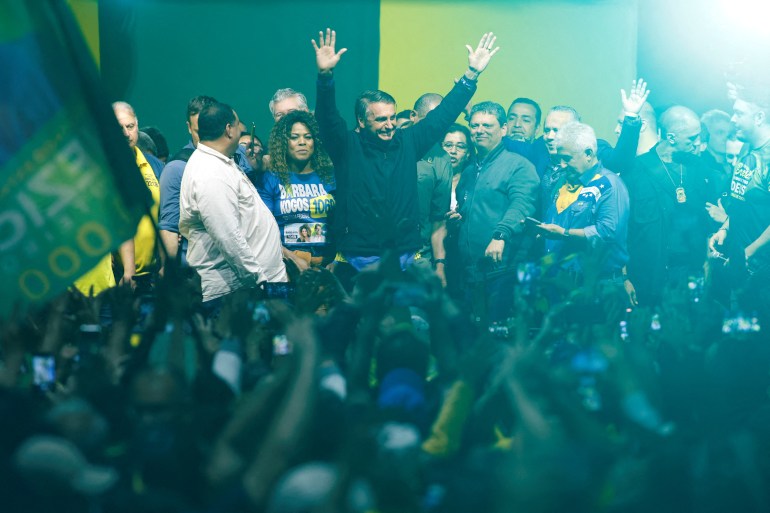
[MUSIC PLAYING]
Halla Mohieddeen: In July, a Worker’s Party official – that’s Lula’s party – was shot dead by a supporter of President Jair Bolsonaro. According to Reuters, this event made federal police call for backup to protect Lula’s people on the campaign trail. The officers warned that former President Luiz Inacio Lula da Silva’s safety was threatened by radicalised opponents. Lucia says incidents like this one have become part of the daily news cycle.
Lucia Newman: A man went into a bar and said, does anybody here plan to vote for Lula? And when somebody said, yes, they killed the person on site. That sort of thing has happened several times now. Well, Bolsonaro says that’s not his fault. He can’t be blamed for that kind of thing. So that sort of violent rhetoric in this context does frighten a lot of people.
Halla Mohieddeen: So what are these candidates with controversial pasts offering in this election, and what are the polls saying? More on that after the break.
[MUSIC PLAYING]
Halla Mohieddeen: Lucia, let’s turn now to the actual policies that the two candidates are presenting to the electorates because the economy’s a big, big issue for Brazilians this election. What are the two candidates bringing to the table when it comes to tackling the economic problems that Brazil is facing?
Lucia Newman: President Bolsonaro believes that what this country needs is an open economy, free-market economy, and that he’s on the right track. And he is basically saying, give me a chance to show what I can do now that the pandemic is over. Lula, on the other hand, is saying let me return to the policies that were implemented back in between 2003 and 2010, which really has to do more with how to distribute money that already exists in this country.
[MUSIC PLAYING]
Lucia Newman: This is a very wealthy country. It’s not suffering a massive economic crisis like others in the region. If Lula can bring about what he calls economic growth, re-industrialise the country because it’s depending too much now on the export of raw materials of commodities and not enough on its potential as an industrial giant of the region and the world. That’s the sort of long-term promise from Lula.
Halla Mohieddeen: Let’s look at the polls now. Lucia, they’re saying that Lula’s in the lead right now. Does that sound accurate to you, or do you think the margins are going to narrow as this election approaches?
Lucia Newman: It’s very hard to say because polls have a tendency to be wrong. But if you can believe what all the polls have been saying consistently, Lula is way ahead and his lead is growing against Bolsonaro every day.
Lucia Newman: The question right now then is not who’s going to win, but whether Lula can actually win straight out in a first round, which would have been unthinkable maybe even a month ago, but now there are polls that suggest that it may very well happen, that he may get more than 50 percent in the first round.
Halla Mohieddeen: Wow, that’s quite significant, isn’t it? If he manages to do that. Do you think that’s a reaction to some of the things that Bolsonaro is saying? Or do you think that if he does breach the 50 percent threshold in the first round of voting, would that be down to the country, coming round to him and forgiving him for the corruption allegations?
Lucia Newman: I think it’s a mixture of all of that. It’s hard to explain how Bolsonaro has gone down so much considering that just four years ago, more than half of the population embraced him and despite everything that he stood for. Now we’re seeing sort of the reverse. People embracing Lula, despite everything that he may or may not have done, but which most people believe he did do. And, I think that it’s a combination of the things that Bolsonaro has said about the democratic system and that is frightening a lot of people that don’t want somebody who goes that far. They don’t want their institutions to be destroyed. And the economic problems that the country is having and the memory people have of how Lula represents the good old days for millions and millions of Brazilians. Even his ideological opponents did well.
[MUSIC PLAYING]
Halla Mohieddeen: But there is one industry that, despite Lula’s promise of economic growth, has largely backed Bolsonaro in this election: the agricultural industry. Much of this stems from tensions with Indigenous peoples of Brazil over the Amazon rainforest. I asked Lucia about it.
Halla Mohieddeen: Can you explain to us what’s going on with the issue of land rights in Brazil, particularly the Amazon. Why are farmers and Indigenous people in conflict and how does this tie into the election?
Lucia Newman: Brazil is one of the few countries in the world where Indigenous people, at least in the Amazon, have a tremendous amount of land. They have reserves, lands that the Constitution allows them exclusively to have.
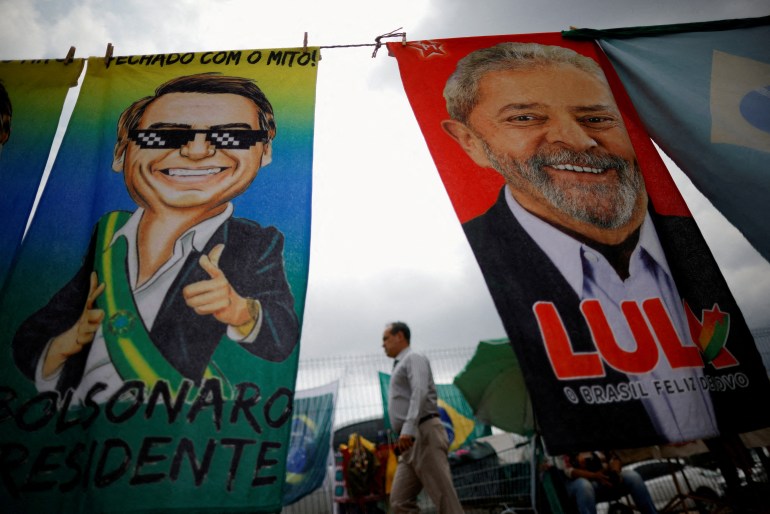
[MUSIC PLAYING]
Lucia Newman: But the problem is that many others are trying to encroach on those lands which are rich in minerals, and also because they want to expand the agricultural frontiers.
Newsreel: Enforcement of Amazon burning has been scaled back under president Jair Bolsonaro, a longtime sceptic of environmental concerns.
Newsreel: The majority of the fires were started intentionally as deforestation fires are to manage farmland.
Lucia Newman: And that is where the conflict is lying. Now, under President Bolsonaro, he has tried to pass laws and has managed to do so, to a certain extent, that would allow the agroindustrial sector to go into the Amazon, and that has raised a lot of tensions for many years, including under Lula. That’s not new. But if you put those things together, you have quite an explosive cocktail.
Halla Mohieddeen: But violence seems to pierce through into other issues in Brazil.
[MUSIC PLAYING]
Halla Mohieddeen: There’s been a lot of violence against Afro-Brazilian religions. Can you explain some of the religious tensions that exist in Brazil and why this is, and have you seen any of this violence while you’ve been reporting in the country?
Lucia Newman: The religious tensions in Brazil, I honestly believe, began with Bolsonaro. And with people like Bolsonaro, because the evangelical sector of this country has grown exponentially. He’s intolerant in general against those who don’t think like him, and that has led to an increase of intolerance of Black religions in this country.
Newsreel: Other African-based faiths have been struggling against harassment as evangelical Christianity gains ground in the country.
Lucia Newman: But more recently, we have seen many, many cases of violence against those religious and even people who consider themselves atheist or Catholics who consider themselves progressive Catholics.
Halla Mohieddeen: And this connection to God is something that Lucia says Bolsonaro takes personally.
Lucia Newman: Bolsonaro and his wife said it clearly and specifically he’s been appointed by God to govern Brazil. This is what they’re saying. He is a representative of God. He is a divine leader. And, Lula’s coming back saying God doesn’t belong to anyone, and that seems to be the fight here.
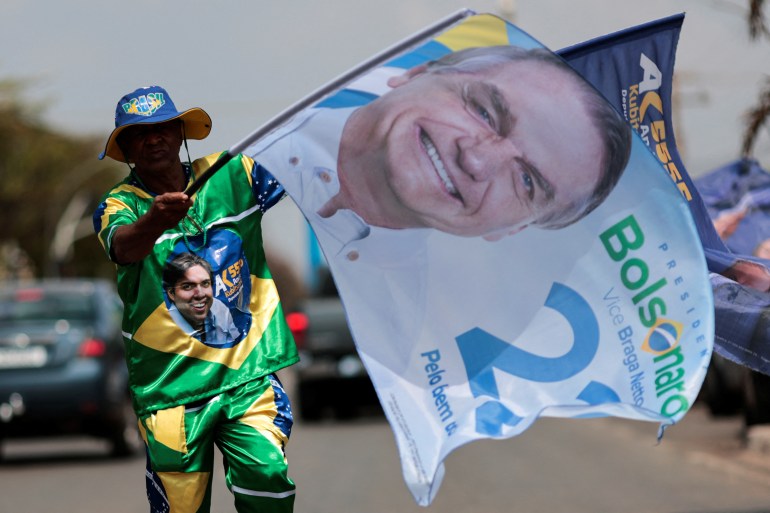
[MUSIC PLAYING]
Halla Mohieddeen: Many are saying that a Lula victory is part of a growing pink tide in Latin America with growing left-wing leaders winning elections in the region. What do you think this election means in the context of Latin America as a whole?
Lucia Newman: I think that Lula very much represents a new chance to create what is called the new left, a more democratic, socially democratic left wing in the region. Brazil is the largest country. It can certainly take the lead again, if Lula, if elected again, is successful in showing that Brazil can bring prosperity with democracy and also with tolerance to all beliefs.
Halla Mohieddeen: We know that Lula supported democratic elections in Venezuela recently, and Colombia has just reopened its borders for trade with Venezuela. So where do you think that relationship between the two countries could be going forward? In the case of a Lula win?
Lucia Newman: I think that in private, Lula is very, very critical of Maduro. In fact, I know this, we’ve spoken about it. But in public, he will say, and in fact, I think he also believes this, you cannot isolate Venezuela. You have to bring it to the fold. You have to talk, you have to negotiate. And so he will try to mediate. He will try to bring President Maduro around if he can. And that’s why he’s been very cautious about criticising him in public.
Halla Mohieddeen: Obviously there’ll be a big impact when it comes to relations within Latin America, but what would happen if either man won when it comes to relations with the United States or, or even the European Union?
Lucia Newman: If Bolsonaro is to be re-elected, he thinks that Brazil has to be a world player and that that will be accomplished through major economic growth by increasing investment and exploitation of, for example, the Amazon and other parts of the country. And that Brazil will set an example through economic might and not necessarily through having relations and or leadership in a political sphere.
Halla Mohieddeen: And with Lula?
Lucia Newman: With Lula, you know, Lula believes in making Brazil a world player because setting a political example, by engaging with different governments, even those that he doesn’t necessarily get along with. And that’s why he did quite well when he was last president. He would probably try to repeat that recipe.
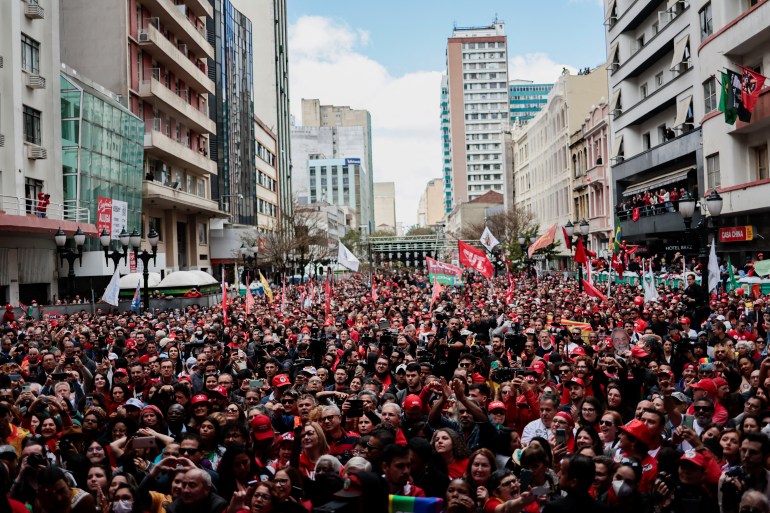
[MUSIC PLAYING]
Halla Mohieddeen: So we’ve got an idea of what a Lula win might look like. What about a Bolsonaro win or a Bolsonaro loss? Like where do you see that panning out?
Lucia Newman: I think people are more concerned about a Bolsonaro loss than a Bolsonaro win. If he loses, how will he react? How will his supporters react? There are more than two million Brazilian civilians that now hold weapons, thanks to his arms policy. He has suggested that there are a lot of people who are willing to go to war with him. But what about all those people out there on the street who are crazy about him? They adore him. They follow him with as much fervour as many follow Lula except that they’re armed. And so you don’t know what would happen.
[MUSIC PLAYING]
Halla Mohieddeen: You’ve covered Brazil through your career for years, now. So what would you say is at stake for Brazil and the region, and what do you think we should be watching for when those results come?
Lucia Newman: Many, many people in the region are looking closely at this election because they’ve been worried about Bolsonaro. Bolsonaro represents a trend that is seen as undemocratic, also a trend that seems to negate climate change, and a whole series of things that worry people in Latin America and indeed much of the world. But they don’t necessarily like Lula, especially because of his track record. The suspicion or the belief that he was willing to go to any lengths, including corruption, to stay in power and that sort of thing worries them as well. So for the rest of the region, it’s also a sort of a ‘which is the lesser of the two evils?’ It’s the same thing that many Brazilians are asking themselves, and I think more people would prefer a president that is willing to engage with them. And who might set an example, in this case, a positive example, economically, ecologically and certainly democratically.
Halla Mohieddeen: And that’s The Take. This episode was produced by Chloe K. Li with Ney Alvarez, Alexandra Locke, Ashish Maholtra, Negin Owliaei, Amy Walters, Ruby Zaman, and me Halla Mohieddeen. Our sound designer is Alex Roldan. Aya Elmileik and Adam Abou-Gad are our engagement producers. Ney Alvarez is Al Jazeera’s head of audio. We’ll be back.
Episode credits:
This episode was produced by Chloe K. Li with Ney Alvarez, and our host, Halla Moheiddeen. Ruby Zaman fact-checked this episode. Our production team includes Chloe K Li, Alexandra Locke, Ashish Malhotra, Negin Owliaei, Amy Walters, and Ruby Zaman. Our sound designer is Alex Roldan. Aya Elmileik and Adam Abou-Gad are our engagement producers. Ney Alvarez is Al Jazeera’s head of audio.